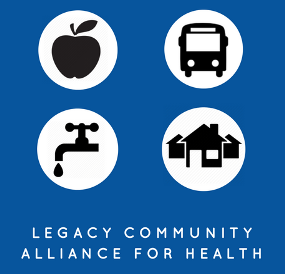News from LCAH
- Middleton, Monona, and Fitchburg teams meet in Madison to discuss health equity
- How Counties Play a Critical Role in Advancing Health Equity
- Appleton using LCAH mini grant to help reach underrepresented communities
- Convening Stakeholders for Rural Transportation in Bayfield
- Wisconsin Rapids completes a rapid Health Impact Assessment on Senior Housing
- Highlighting Fitchburg’s Healthy Neighborhood Initiative
- Appleton is the first community in Wisconsin to pass a Health in All Policies Ordinance!
- Health Alliance Brings Together Statewide Partners
Middleton, Monona, and Fitchburg teams meet in Madison to discuss health equity
-By Katya Spear, Senior Associate, COWS, UW Madison, December , 2019
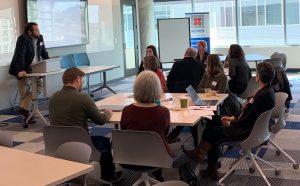
New city staff being oriented to LCAH.
In November, LCAH teams from Middleton, Monona, and Fitchburg met to orient new city staff to the discussions they’ve been having around health equity and Health in All Policies. The event featured an overview of HiAP and provided time for teams to workshop their projects and participate in peer learning activities. Fitchburg continues to focus on robust community engagement through its Neighborhood Navigators program as part of its Healthy Neighborhood Initiative. Both Middleton and Monona are interested in applying health equity tools and analysis to facilities and planning projects. Similar to these three communities in Dane County, there are clusters of cities, villages, and counties participating in LCAH around the state (see map at the top of the page). Let us know if you’d like support in connecting with communities in your region on HiAP, or if you have new staff that you’d like to orient to HiAP.
How Counties Play a Critical Role in Advancing Health Equity
-By Marybeth McGinnis, Associate Outreach Specialist, COWS, UW-Madison, September 2019
Health in All Policies (HiAP) is a framework for recognizing and addressing health inequities by centering the social determinants of health impacts in discussions of wide-ranging policy topics. HiAP incorporates five elements, each of which are crucial for the success of policies across diverse departments and sectors that aim to reduce health inequities:
- Promote health, equity, and sustainability.
- Support intersectoral collaboration.
- Benefit multiple partners.
- Engage stakeholders.
- Create structural or process change.
Appleton using LCAH mini grant to help reach underrepresented communities
-By Katya Spear, Senior Associate, COWS, UW Madison, August 23, 2019
Following the LCAH Community Engagement training this past April, LCAH offered $1000 mini grants to participating communities to help fund engagement activities that support their health equity work. To receive the grant, communities must complete a short community engagement plan. Once the plan is approved by LCAH, the funds are released. That’s it!
So far, two communities have been approved for the mini grant. Below, Appleton, one of the communities approved, describes how they are using their mini grant funds to enhance their health equity work. If your community hasn’t yet completed the steps to recieve its mini grant, contact us today to finish the process and get your funds!
 “The City of Appleton wants to better understand the health needs of their residents and work to reduce health inequities in their community. Our goal is to add to existing data sets such as: key leadership surveys, random adult phone surveys and the Youth Risk Behavioral Surveillance Study (YRBSS) .
“The City of Appleton wants to better understand the health needs of their residents and work to reduce health inequities in their community. Our goal is to add to existing data sets such as: key leadership surveys, random adult phone surveys and the Youth Risk Behavioral Surveillance Study (YRBSS) .
We are talking directly with people who are often underrepresented or where community resources may be helpful for targeted members of the community though a series of listening sessions. To date Appleton has reached out to marginalized groups such as people of color, residents with physical disability, community members with limited resources, youth, and the LGBTQ community. Each of these listening sessions is scheduled for a minimum of one hour. Community leaders and elected officials have been involved in the discussions surrounding these community conversations and several have taken active involvement in the planning and facilitation of these sessions to create a more supportive environment for participants. We are using LCAH’s mini grant funding to incentivize community participation in the listening sessions with snacks and gift cards.
The summary of these findings will be included in Appleton’s next community health assessment and community health improvement plans. This work will meet the requirements for accreditation of our health department in the process. The community engagement training with LCAH helped us better understand the value of stakeholder engagement in our community work. The workshop examples and the dialogue with other communities were very well done.”
Congratulations to Appleton for being approved for the community engagement mini grant! If your community has been approved for a community engagement mini-grant and would like to be featured in the next LCAH newsletter, please let us know!
Convening Stakeholders for Rural Transportation in Bayfield
-By Katya Spear, Senior Associate, COWS, UW Madison, May 30, 2019
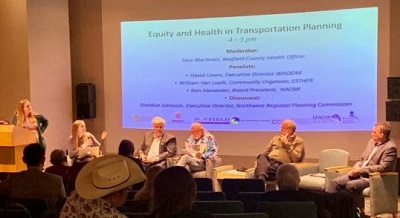
Panelists discuss the role of health and equity in transportation planning at the Rural Transportation Summit in Bayfield.
Bayfield County hosted a rich discussion on challenges and opportunities in rural transportation during a day-long Rural Transportation Summit on April 16th. The event was organized in collaboration with and support from partners from Northwest Regional Planning Commission, Bay Area Rural Transit, UW Madison, UW Extension, the Wisconsin Counties Association, and the League of Wisconsin Municipalities.
Sessions focused on best practices and emerging innovations in rural transportation, the important connections between transportation and health equity, and the need for broad community and stakeholder engagement in transportation planning decisions. Notable attendees included State Senator Janet Bewley and State Representative Beth Meyers, and Wisconsin’s Lieutenant Governor joined the group at lunch to talk about the importance of rural transportation access for health equity and proposed increases to transit and transportation options in the state budget. This event will continue to propel the ongoing work that Bayfield County and its partners are doing to increase access to transportation.
Wisconsin Rapids completes a rapid Health Impact Assessment on Senior Housing
-By Madeline Petz, Community Development Specialist, City of Wisconsin Rapids, March 4, 2019
With support from the Legacy Community Alliance for Health project (2017-2022), the City of Wisconsin Rapids has teamed up with the Wood County Health Department to conduct a series of Rapid Health Impact Assessments(HIA) on timely development projects taking place in the City.
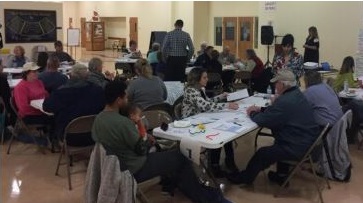
Wisconsin Rapids completed a rapid Health Impact Assessment on Senior Housing
The first HIA in the series focuses on a new senior housing development in the central core of the City. With direction from a project advisory team made up of various community leaders, the City selected this as our first HIA to satisfy a local desire to devote attention to housing needs and associated health impacts in the community. We were also eager to zoom in on this downtown neighborhood, where multiple other exciting developments are either underway or slated for the near future. This geographic focus provides a way to explore some of the broader health impacts that the project has the potential to influence by way of proximity; or how appropriate planning can ensure that all of the connected developments together generate positive ripple effects for the whole population.
The learning and execution of the HIA process was a great success, and the recommendations generated for the senior housing development are currently coming to life. The senior housing development will open for business in the fall of 2019, including impactful building and site design elements that are direct results of recommendations from the HIA.
The advisory team is concurrently developing an HIA Matrix that summarizes our collective and co-created health areas of focus and the subtopics we are interested in exploring within each. Our intent is to use the Matrix to screen other potential HIA projects in the future, while also providing a less intensive, but still effective, tool to routinely incorporate health into City decision-making and considerations. We also plan to carry out another HIA by the end of summer 2019.
Informed by a Health in All Policies approach, the City is using the HIA project experience to build the appropriate local capacity to incorporate a tangible health lens tool into planning processes, which will evolve into the new “business as usual”. The City is also motivated by the community engagement component inherent to HIA projects, which allows staff and elected officials to further increase transparency and trust in local government decision-making processes, as this has been identified as a need in the community. We are grateful for the stakeholders we have at the table and excited about the potential this approach has to support long term positive changes in health outcomes in the community.
You can read the full text of our newly released HIA Report here.
Highlighting Fitchburg’s Healthy Neighborhood Initiative
-By Katya Spear, Senior Associate, COWS, UW Madison, November 9, 2019
The city of Fitchburg has launched a 5-year inter-departmental pilot program to identify neighborhoods struggling with access to services and opportunities and to engage residents in those areas to co-create and implement solutions that have a beneficial impact on health, well-being, and equity. The initiative, called the Fitchburg Healthy Neighborhood Initiative (HNI), is already seeing progress in the following areas:
- Working in partnership with United Wayto develop a “Fitchburg Fund” (a community-based fund-raising campaign spearheaded by United Way, focusing on N. Fish Hatchery Road
Neighborhood and HNI priority issues) - Exploring local food drink/concession contracts in select City parks and ways to potentially direct revenues to the HNI
- Implementing the HNI grant program, with $46,000 in awards in 2018 to five different community/neighborhood organizations focusing on: Youth education; Neighborhood engagement; Food access/security; Sexual/domestic violence; and Environment/local food systems. Similar grant program funding has been included in the 2019 draft budget as well.
- Working in partnership with Dane County Department of Human Services, and their funding, to develop a N. Fish Hatchery Road Neighborhood Navigator Program (hiring two neighborhood residents to connect other neighborhood residents with needed resources/programs/services, and facilitate better communication and resource/program/service development and delivery between City and neighborhood)
- Secured funding to initiate Nine Springs Neighborhood “Hub” (i.e. neighborhood center) site planning at the City-owned Nine Springs Golf Course and future adjacent park space, with various non-profit partners
- Working with a non-profit partner to develop a Verona Road West Neighborhood “Hub” at a privately-owned facility
- Allocating funding to initiate North Fish Hatchery Road corridor planning.
HNI is an exciting effort by the city of Fitchburg to improve health and well-being. For more information, please contact Wade Thompson, City of Fitchburg Project Planner, at [email protected].
Appleton is the first community in Wisconsin to pass a Health in All Policies Ordinance!
-By Katya Spear, Senior Associate, COWS, UW Madison, July 20, 2018
Appleton staff attended a Health in All Policies (HiAP) training with LCAH colleagues in spring 2017. Staff that attended thought that one way to institutionalize considerations of health equity in day to day decision making in the city was to pass an HiAP ordinance. Appleton Health Department Officer Kurt Eggebrecht and his colleagues formed a interdepartmental “Health in All Policies team,” which spent the next few months drafting an ordinance and presenting it – and the social determinants of health model – to key committees and stakeholders in the community to increase common language, understanding, and buy in. The city passed the ordinance in December 2018 and is working to implement it, beginning with a focus on accessible built environment structures that promote health and safety. Learn more by accessing these resources:
- January 2018 Article: Creating a Healthier, More Equitable Appleton
- April 2018 Webinar: Passing a Health in All Policies Ordinance in the City of Appleton
- Appleton Health in All Policies website
Health Alliance Brings Together Statewide Partners
-January 2017
Across Wisconsin, opportunities to live a long, healthy life are not shared equally by all. Many of Wisconsin’s health outcomes lag behind national averages, and the state is home to some of the most extreme health disparities in the nation. In response to this problem, Wisconsin local governments, state agencies, academic partners, and nonprofit groups have joined forces to create the Legacy Community Alliance for Health (LCAH). The collaborative was awarded a $1 million Community Impact Grant from the Wisconsin Partnership Program at the UW School of Medicine and Public Health. Through the project, the LCAH aims to improve health and health equity through local government policymaking and programming.
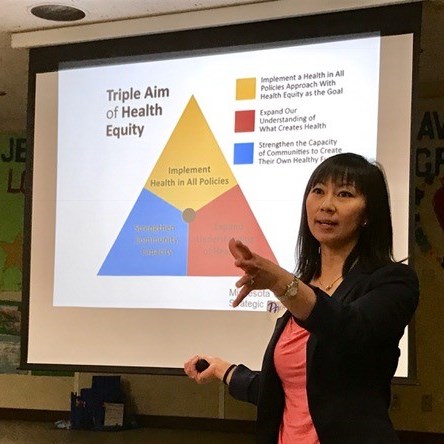
Population Health Institute’s Paula Tran Inzeo
LCAH, which launched in January 2017, is a five-year project to build capacity within participating municipalities to improve health and health equity through the use of data and evidence-informed policies. The goal is to help communities achieve gains in at least one of four policy areas of interest: clean water, active transportation, safe and affordable housing, and healthy and affordable local food systems. Each participating community will choose its own policy approach.
Participating communities will be drawn from the Green Tier Legacy Community Network, a coalition of local governments focused on advancing goals around sustainability, equity, and economic growth with the support of participating organizations and state agencies. Academic partners under the umbrella of the UW-Madison UniverCity Alliance will support this work with data, research, evaluation and training expertise. These diverse partners are excited to work with local governments in Wisconsin to improve the long-term health of their constituents and communities.
Resources
Websites
- COWS: Health in All Policies website
- Population Health Institute: Mobilizing Action Toward Community Health (MATCH) program
- Wisconsin Health Atlas: Local Data for Action
- Wisconsin Food Security Project: data on food access and the food security infrastructure
- What Works for Health: find policies and programs that are a good fit for your community’s priorities
- County Health Rankings & Roadmaps: revealing snapshot of how health is influenced by where we live, learn, work and play
- Wisconsin Obesity Prevention Initiative: committed to confronting the state’s emerging obesity epidemic
- Statewide Obesity Map: scope of the obesity epidemic
- Smaller Legacy Cities: Eight Strategies for Postindustrial Success: Tools for Local Leaders
LCAH e-news archives
Webinars:
- Health and Health Equity Impacts of Water and Water Policy in Wisconsin Communities
- Municipal Food Policy to Impact Health and Health Equity in Wisconsin Communities
- Municipal Housing Policy & Programming
- Municipal Transportation Policy to Impact Health and Health Equity in Wisconsin Communities
- Passing a Health in All Policies Ordinance in the City of Appleton
- Sustainable Strategies webinar – 5 Key Elements of Health in All Policies
